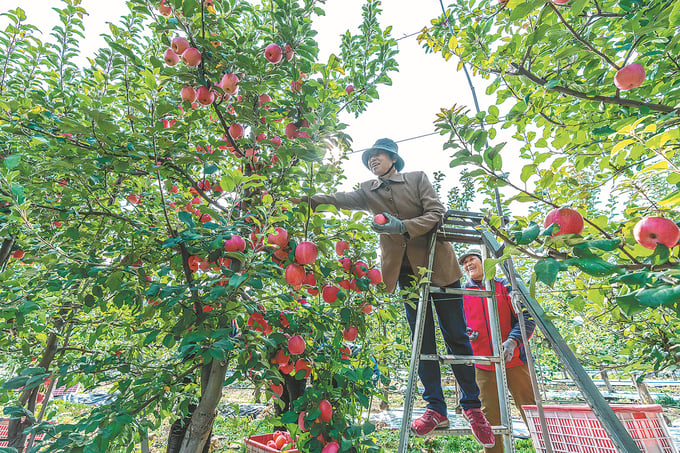November 21, 2025 | 12:19 GMT +7
November 21, 2025 | 12:19 GMT +7
Hotline: 0913.378.918
November 21, 2025 | 12:19 GMT +7
Hotline: 0913.378.918

Farmers pick apples at an orchard in Wanrong county, Yuncheng, Shanxi province, in November. Photo: China Daily
"We used to sell our apples at the markets in the county. Our apples are now sold across the country through my WeChat Moments," said Zhang, who lives in Wanrong county of Yuncheng in North China's Shanxi province.
The young woman said that around 30 percent of her apple yield can be sold via the internet.
Yuncheng is dubbed the "golden apple production base" due to its geographic and climate advantages. With a total plantation area of 100,000 hectares, the annual apple output in Yuncheng reaches 4 billion kilograms and planting apples has become a mainstay for many farmers.
In 2021, the brand value of the "Yuncheng Apple" was over 5.6 billion yuan ($803.5 million), according to Fan Boping, director of the city's fruit industry development center.
However, the high-quality fruit didn't bring good profits for the growers. It was challenging to find buyers and the sales volume was not guaranteed, said Jia Jinmao, a local farmer.
"I have seen many young people return to the county from big cities in recent years. They sell apples on the internet and the fruit can go directly to the customers. It truly broadens sales channels, which makes me want to have a go at e-commerce," Jia said.
"You have to know how to grow apples on the one hand and how to sell on the other hand. The internet can help you sell good things at a good price," said Zhang, adding that she participated in e-commerce training held by the county government and is preparing an online shop.
Meanwhile, the improving logistics system in rural areas has also boosted e-commerce development. As of July, a vast logistics network had covered all the 1,541 villages of 117 townships in Yuncheng.
"The popularity of the internet and the improvement of rural logistics have made the Yuncheng Apple go further and sell at a good price. It's also helped rural revitalization," said Geng Yeqiang, a professor at the School of Economics and Management at Shanxi University.
The change in apple sales in Yuncheng is the epitome of the change in Chinese farmers' lives. Since the country has promoted the coordinated development of the rural revitalization strategy, rural residents have seen their incomes and living standards improve.
Data from the National Bureau of Statistics showed that, in 2021, the per capita disposable income of rural residents nationwide grew by 9.7 percent year-on-year to 18,931 yuan, up 125.7 percent from 2012.
(Xinhua)

(VAN) In a new study published in Trends in Biotechnology, researchers used a gene-editing technology called CRISPR to increase a fungus's production efficiency and cut its production-related environmental impact by as much as 61%- all without adding any foreign DNA.

(VAN) A top official in Beijing’s Cop delegation says China is committed to clean energy – but US’s absence is a problem.

(VAN) The Bangsamoro region’s inflation rate rose slightly to –1.3 percent in October 2025 from –1.5 percent in September, the Philippine Statistics Authority (PSA-BARMM) reported.

(VAN) FAO-led report says protecting and restoring forests is crucial to boosting climate-resilient agriculture, rural livelihoods and global food and water security.

(VAN) Flagship partnership secures additional GBP 16.9 million to strengthen forest monitoring, transparency and country support to 2030.

(VAN) After a turbulent year for international development, the aid and assistance landscape has shifted, with donors rethinking how, where and why they support sustainable development.

(VAN) A new tool for measuring the economic value of farm animal welfare improvements has been developed, potentially transforming how consumers, retailers and the government evaluate animal welfare policies.